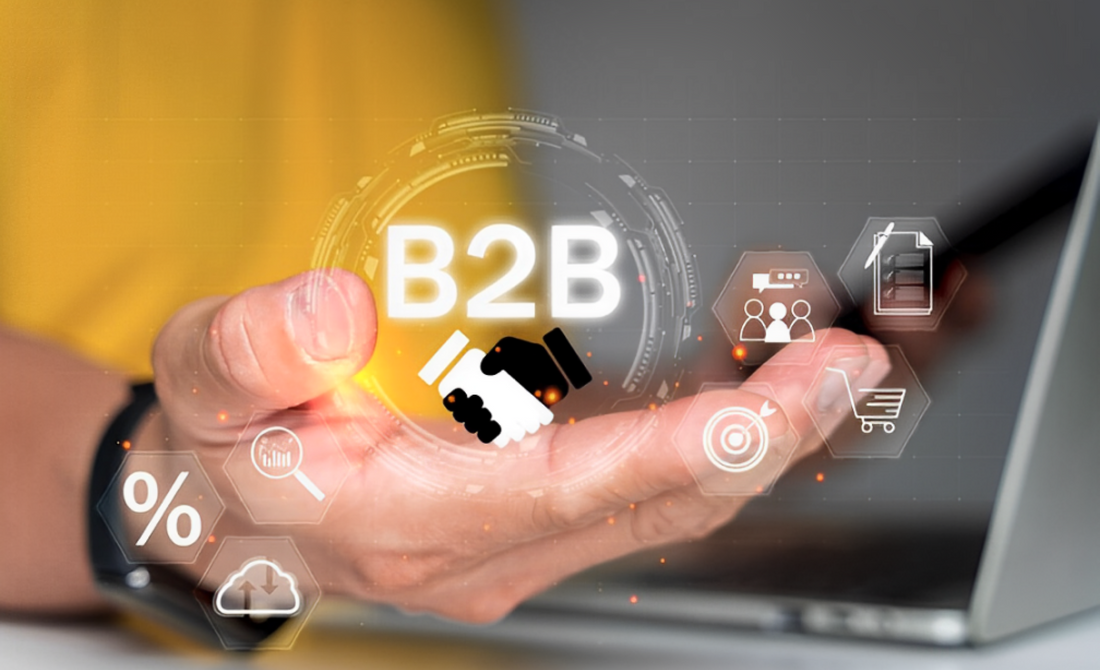The Ultimate Guide to Mastering Shopify B2B ecommerce
ecommerce
shopify
shopify B2B ecommerce

You’ve got your Shopify store up and running, the sales are rolling in, and things look good. But then you start noticing something—large orders trickling in from businesses, inquiries about bulk pricing, and requests for customized invoicing.
That’s when it hits you—there’s a whole new world beyond B2C, and it’s called B2B ecommerce.
We’ve seen businesses jump into Shopify B2B thinking it’s just about slapping a "Wholesale" tab on their site.
Spoiler alert—it’s not.
From setting up custom pricing to managing bulk orders and streamlining client relationships, there’s a science to getting it right. And when you do, you don’t just sell products—you build partnerships that keep the cash flowing.
A Basic Understanding of Shopify B2B Ecommerce
Shopify B2B ecommerce refers to the online exchange of products and services between businesses using the Shopify platform.
Unlike B2C, where transactions are typically simple and cater to individual consumers, B2B ecommerce involves intricate processes.
These include managing large order volumes, implementing complex pricing structures, and navigating detailed negotiations. Shopify addresses these complexities by offering features such as:
- Custom Pricing: Tailor pricing for different clients, ensuring each business partner receives terms that reflect their unique agreements.
- Bulk Ordering: Simplify the purchasing process for clients who need large quantities, making it efficient and user-friendly.
- Personalized Customer Portals: Provide clients with dedicated portals where they can track orders, manage invoices, and communicate directly, enhancing transparency and trust.
For example, a retailer sourcing bulk products from a distributor or a manufacturer ordering specific components for their production lines are typical B2B ecommerce transactions.

Also read: The role of headless commerce in Shopify.
How Shopify Supports B2B Ecommerce?
Navigating the B2B space can often feel like assembling a complex puzzle. Shopify plus offers the scalability, flexibility, and a range of other features tailored for businesses in manufacturing, distribution, and wholesale.
Let us explore how Shopify plus helps to grow your B2B ecommerce business:
#1 Unified platform for B2B and DTC
Managing separate platforms for B2B and direct-to-consumer (DTC) sales can be a logistical nightmare. Shopify Plus offers the capability to run both B2B and DTC operations from a single platform, streamlining processes and reducing overhead.
#2 Tailored buying experience
Shopify plus offers the flexibility to tailor shopfronts as custom pricing, curated catalogs, and tailored content for each client, enhancing their purchasing experience.
per the requirements of their B2B clients. In other words, Shopify plus provides you with custom pricing, curated catalogs, and tailored content for each client, enhancing their purchasing experience.
#3 Advanced inventory and order management
Real-time inventory tracking ensures that businesses are always aware of stock levels, preventing overselling and stockouts. Coupled with efficient order management tools, Shopify Plus ensures that bulk orders are processed smoothly, keeping clients satisfied.
#4 Flexible payment options
Whether it's net payment terms, deposits, or immediate payments, Shopify B2B ecommerce can set terms that align with their clients' needs.
#5 Integration with third-party applications
No business operates in isolation. Shopify Plus allows for integration with a plethora of third-party applications, from ERP systems to CRM tools, ensuring that all facets of the business communicate effectively.
#6 Self-serve portals for clients
Allowing clients with self-serve portals means they can place orders, track shipments, and manage their accounts without constant assistance. This not only improves client satisfaction but also frees up your team's resources.
Also read: Master Ecommerce SEO audit
The Growing Impact of Shopify B2B ECommerce
The worldwide B2B ecommerce market was estimated to be worth over USD 7 trillion in 2022, and industry projections predict that it would expand at an astounding 20% CAGR from 2023 to 2030. This growth is fueled by businesses recognizing the efficiency and cost-effectiveness of conducting procurement online.
Leading this change are sectors including manufacturing, retail, and wholesale distribution. Businesses who previously depended on conventional sales techniques are increasingly using Shopify B2B ecommerce in order to secure their operations for the future.
Key Models of Shopify B2B ECommerce

Shopify’s B2B ecommerce can cater to several different business models. Let's explore the primary types:
- Business-to-Business-to-Consumer (B2B2C)
According to this approach, Shopify B2B companies sell their goods to other companies, who resell them to final customers. For instance, a business-to-business organisation can collaborate with a retailer to sell its goods directly to customers through an online store. This strategy offers a wider reach by combining the benefits of B2B and B2C.
Example: A company that uses Shopify Plus could act as a wholesaler, selling to smaller merchants who resell to final consumers through their Shopify stores.
- Wholesale
Wholesale is the practice of selling goods to other companies in large quantities. Shopify B2B vendors cater to the demands of large purchasers by providing bulk pricing, discounts, and customised terms.
Retailers or other businesses may purchase inventory from a wholesaler to resell or use within their operations.
Example: By using Shopify, a food distributor could offer bulk discounts to retailers on products, with tailored pricing based on order size and frequency.
- Manufacturer
Shopify is frequently used by manufacturers to sell components or finished products directly to businesses. By leveraging Shopify’s platform, producers can smoothen their sales processes by offering features like bulk order management and product customization options.
For instance, an electrical component maker can use Shopify to sell directly to IT firms that need parts for assembly processes.
- Distributor
Distributors operate as middlemen by buying goods from producers and reselling them to retailers or final customers. Shopify gives distributors a platform to effectively handle numerous transactions, negotiate with manufacturers, and manage huge inventories.
For instance, a distributor in the automotive sector can buy parts from several manufacturers and resell them to dealerships and repair shops.
Key Stages In Building A Shopify B2B ECommerce Business
Let us now discuss the key stages involved in growing a B2B ecommerce business.
- Start-Up
During this fundamental phase, companies concentrate on developing a solid online presence and defining their value offer. This phase can involve creating a minimal viable product (MVP), obtaining capital, and establishing a platform to draw in the initial group of suppliers and customers for Shopify B2B companies.
Actionable Tips:
- Create a functional, user-friendly Shopify store designed for business-to-business interactions.
- Build a strong brand that communicates reliability as well as confidence to prospective business clients.
- Growth
The focus switches to scaling operations once a business starts to achieve traction. This entails expanding the consumer base, improving customer service, and optimising the supply chain.
Actionable Tips:
- Invest in tools to automate repetitive tasks, such as using customisable workflows offered by Shopify.
- Use integrated analytics provided by Shopify to monitor expansion and improve the purchasing experience.
- Expansion
At this point, companies might look to introduce new goods or penetrate new markets. International sales and supplier collaborations are two examples of expansion tactics.
Actionable Tips:
- Use the multi-currency feature of Shopify to serve clients from around the world.
- Form alliances with companies that compliment your brand to expand your customer base.
- Maturity
During the maturity phase, companies concentrate on simplifying processes to increase efficiency and profitability. This might involve exploring advanced Shopify Plus features, such as automation and API integration, to manage complex supply chains and customer relationships.
Actionable Tips:
- Use Shopify to integrate third-party logistics (3PL) providers and simplify operations.
- Consider offering exclusive services to repeat customers to maintain loyalty.
Shopify B2B Ecommerce: Myths vs Facts
Today we will debunk some of the common myths related to B2B ecommerce businesses.
Myth #1: B2B ecommerce is relevant only for large enterprises
Fact: Shopify B2B ecommerce isn't just for big businesses. Leveraging features like real-time inventory updates, bulk discounts, and customised pricing can also be beneficial for small and mid-sized enterprises.
Myth #2: People avoid doing online bulk purchases
Fact: Online bulk purchases are easier and quicker for many businesses. Shopify B2B platforms offer configurators and quoting tools to accommodate large orders and customize transactions.
Myth #3: B2B ecommerce sales can only happen on marketplaces
Fact: Bypassing third-party marketplaces entirely, many successful B2B companies sell goods, develop lasting relationships, and offer excellent client service through their own Shopify websites.
Myth #4: B2B buyers don’t care about user experience
Fact: Gone are the days of clunky, outdated wholesale portals. Modern B2B buyers expect seamless navigation, mobile-friendly interfaces, and self-service options—just like B2C shoppers. Shopify B2B lets you create a polished, easy-to-use experience that keeps buyers coming back.
Myth #5: B2B ecommerce lacks personalization
Fact: Shopify B2B ecommerce allows businesses to personalize customer experiences with custom catalogs, tailored pricing, and exclusive discounts for different clients. This level of personalization strengthens customer relationships and drives long-term loyalty.
Myth #6: B2B transactions are too complex for automation
Fact: With Shopify’s automation tools, businesses can streamline invoicing, reordering, and approvals, making complex transactions more efficient. Features like automated workflows and contract pricing simplify operations, freeing up time to focus on growth.
Final Thoughts
Gaining proficiency in Shopify B2B ecommerce can help you achieve sustainable growth, regardless of whether you're a startup trying to get traction or an established business breaking into new markets. By understanding the nuances of B2B transactions, leveraging Shopify’s features, and avoiding common misconceptions, your business can stay competitive in the digital age.
So, if you're ready to take the plunge, Shopify B2B ecommerce can be your gateway to future-proof your operations.
CrawlApps
At CrawlApps, we don’t just build Shopify stores—we create experiences that sell. We’re a bunch of problem-solvers who love turning ideas into stores that actually converts. Whether it’s fixing what’s broken or building something from scratch, we make sure every detail works in your favor. No fluff, no jargon—just real solutions that help your business grow. If you’re serious about Shopify, you’ll feel right at home with us.















